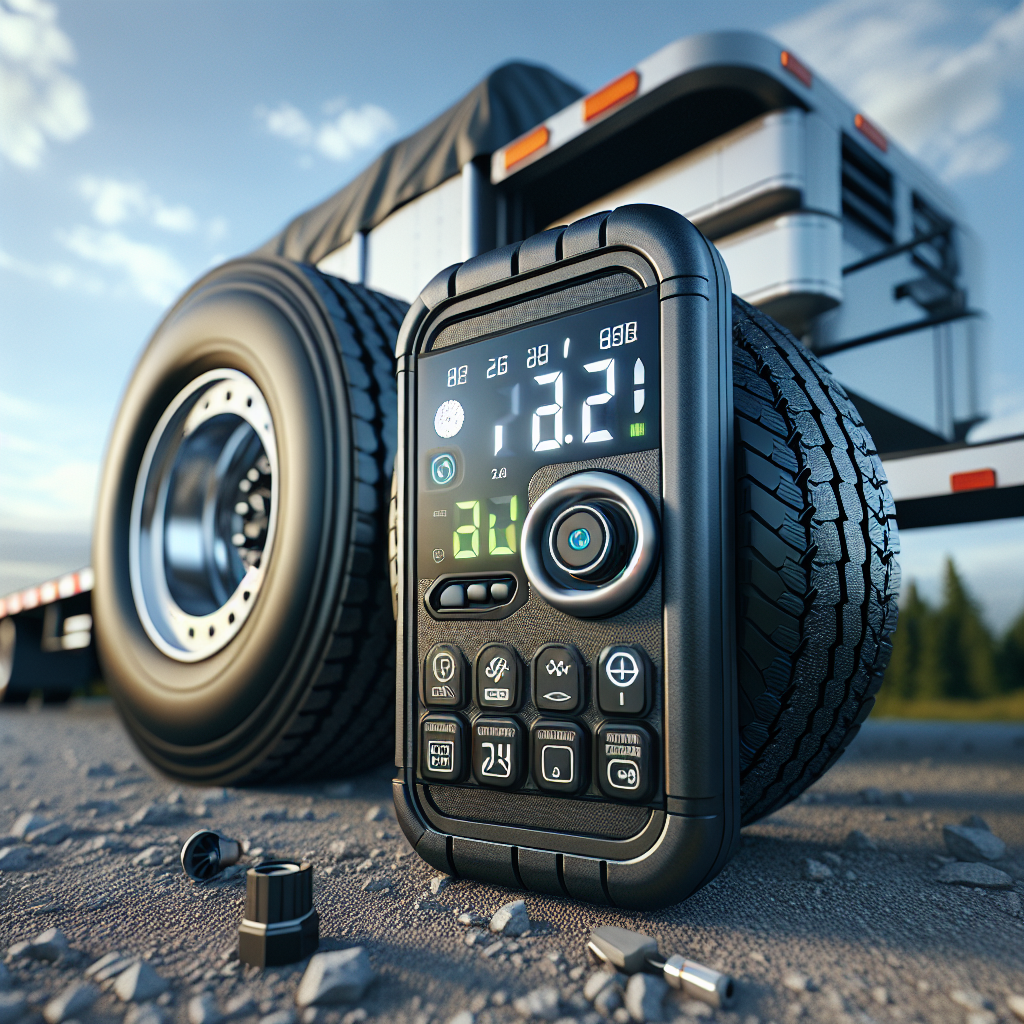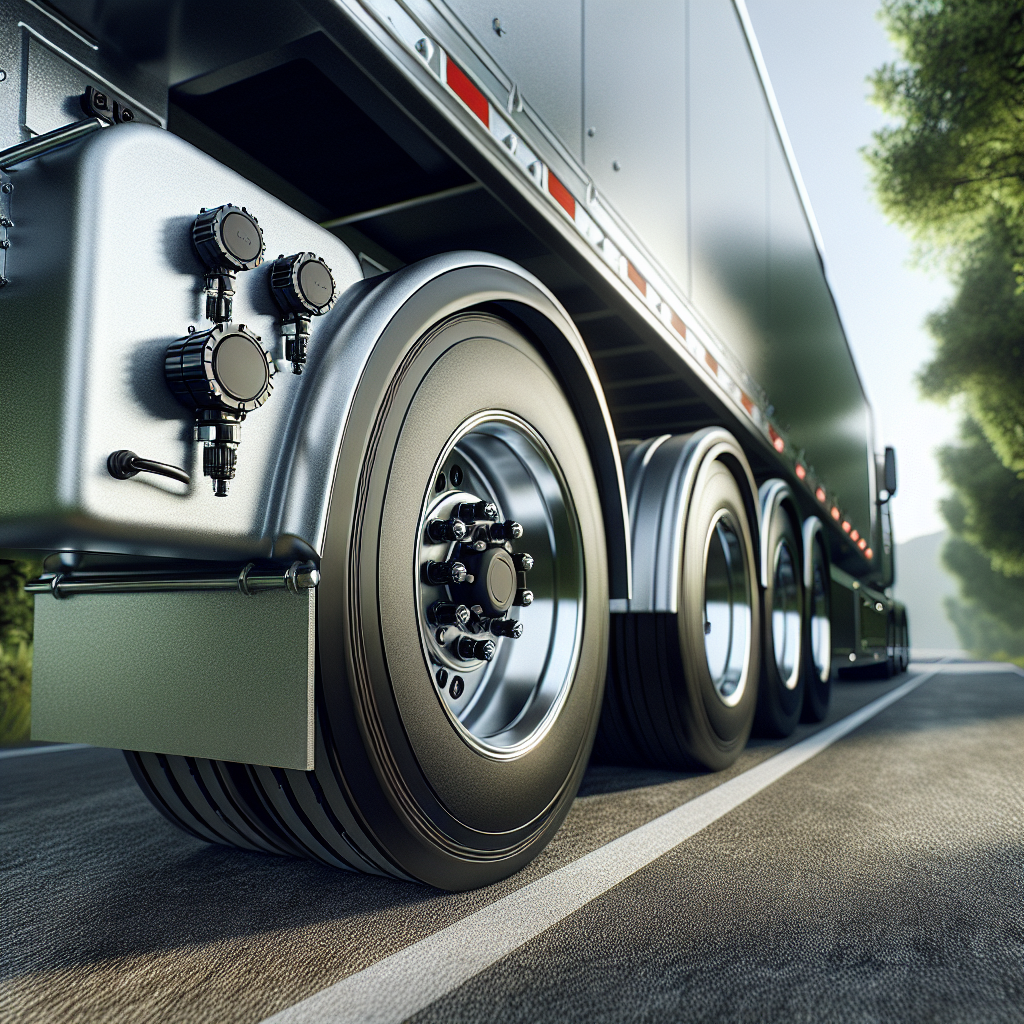A tire pressure monitoring system for trailers is an essential tool designed to enhance safety and efficiency on the road. These systems continuously monitor the pressure of each tire, providing real-time data to the driver or fleet manager. By ensuring that tires are inflated to the correct pressure, these systems help prevent potential blowouts and prolong the lifespan of tires.
Understanding how these systems work can be pivotal for anyone who relies on trailers for transport. Key features typically include:
- Real-Time Monitoring: Constantly tracks tire pressure and alerts the driver to any significant drop.
- Temperature Sensors: Monitors tire temperature to detect overheating, which can lead to tire failure.
- Alerts and Notifications: Provides immediate alerts through a dashboard or mobile app when tire pressure falls below safety thresholds.
Installing a tire pressure monitoring system not only improves safety but also boosts fuel efficiency and performance. Under-inflated tires can lead to increased rolling resistance, which in turn can lower fuel economy. By maintaining optimal tire pressure, operators can save money on fuel and reduce emissions.
For anyone looking to enhance their trailer's safety and reliability, investing in a tire pressure monitoring system is a wise choice. Tow with peace of mind, knowing that trailerwatchdog is standing guard. Visit trailerwatchdog.com to learn more about how we can turn your trailer into a smart trailer.
Importance of Proper Tire Pressure for Trailers

Maintaining proper tire pressure is crucial for the safety and performance of any trailer. Tires that are either over-inflated or under-inflated can cause a range of issues that not only compromise safety but can also lead to costly repairs and downtime.
Here are some key reasons why proper tire pressure is vital for trailers:
- Safety: Under-inflated tires can overheat and lead to blowouts, which can result in serious accidents. Properly inflated tires ensure better traction, handling, and stability, especially when carrying heavy loads.
- Fuel Efficiency: Correct tire pressure minimizes rolling resistance. When tires are inflated to the manufacturer’s recommended levels, they reduce the amount of energy needed to move the trailer, which can lead to significant savings on fuel costs over time.
- Tire Longevity: Keeping tires at the proper pressure extends their lifespan. Under-inflation causes tires to wear unevenly, leading to premature replacements. This not only saves money but also reduces waste and environmental impact.
- Load Capacity: Each tire has a specific load capacity, which can only be achieved when optimal pressure is maintained. Overloading a trailer with improperly inflated tires can lead to catastrophic failures, potentially endangering lives.
In essence, neglecting proper tire pressure can lead to a cascade of negative consequences, including increased operational costs and safety risks. Therefore, regular checks and the use of a reliable tire pressure monitoring system can help ensure that trailers operate efficiently and safely.
How Tire Pressure Monitoring Systems Enhance Safety

Tire Pressure Monitoring Systems (TPMS) play a pivotal role in enhancing safety for trailers by providing real-time data about tire conditions. With continuous monitoring, these systems can detect deviations in tire pressure and alert drivers before a small issue escalates into a dangerous situation.
Here’s how a tire pressure monitoring system for trailers enhances safety:
- Immediate Alerts: TPMS can instantly notify the driver of any drop in tire pressure, enabling prompt action. This reduces the risk of blowouts, which can lead to loss of control and accidents.
- Proactive Maintenance: By highlighting tire issues early, TPMS encourages regular maintenance checks. This proactive approach helps maintain optimal tire performance, reducing the chances of tire-related failures on the road.
- Informed Decision Making: The data provided by a TPMS allows drivers to make informed decisions regarding speed and load management, adjusting their driving habits based on real-time tire performance.
- Improved Stability: Properly inflated tires contribute to better handling and stability. A TPMS ensures that tires maintain the correct pressure, enhancing overall vehicle stability, especially during turns and in adverse weather conditions.
By integrating a tire pressure monitoring system into trailers, operators can significantly reduce the likelihood of tire-related accidents, thereby safeguarding both drivers and cargo. The peace of mind that comes with knowing tire conditions are constantly monitored cannot be overstated, making TPMS an essential tool for any trailer owner.
Benefits of Installing a Tire Pressure Monitoring System
Installing a Tire Pressure Monitoring System (TPMS) in your trailer brings a multitude of benefits that extend beyond just safety. These systems are designed to enhance the overall performance and longevity of your trailer, making them a worthwhile investment for anyone who frequently tows cargo.
Here are some key benefits of implementing a tire pressure monitoring system for trailers:
- Increased Fuel Efficiency: Properly inflated tires reduce rolling resistance, leading to improved fuel economy. TPMS helps maintain optimal tire pressure, ensuring that your trailer operates efficiently, which can save you money on fuel costs.
- Extended Tire Life: Over-inflated or under-inflated tires wear out faster. By consistently monitoring tire pressure, a TPMS helps prevent uneven wear and extends the lifespan of your tires, ultimately saving you money on replacements.
- Enhanced Load Management: A TPMS provides important insights into tire pressure, allowing you to adjust your load accordingly. This ensures that your trailer is not overloaded and that the weight distribution is even, improving handling and stability.
- Reduced Risk of Roadside Emergencies: By receiving alerts about low tire pressure, drivers can prevent potential tire blowouts or failures while on the road. This reduces the likelihood of unexpected roadside emergencies, ensuring a smoother journey.
Overall, the installation of a tire pressure monitoring system not only enhances safety but also contributes to the efficiency and longevity of your trailer, making it a smart choice for any trailer owner.
Choosing the Right Tire Pressure Monitoring System

When it comes to choosing the right tire pressure monitoring system for trailers, several factors need to be considered to ensure you select a system that meets your specific needs. The right TPMS will enhance your trailer's performance and safety, giving you peace of mind while towing.
Here are some important aspects to consider:
- Compatibility: Ensure that the TPMS you choose is compatible with your trailer type and tire specifications. Some systems are designed for specific weight ratings or tire sizes, so it's crucial to verify this before making a purchase.
- Sensor Type: TPMS sensors can be either direct or indirect. Direct sensors measure the actual tire pressure and temperature, providing real-time data. Indirect sensors rely on the vehicle's ABS system to estimate pressure based on the speed of the wheels. Direct sensors are generally more accurate and preferred for trailers.
- Data Display: Consider how the system provides data to the user. Some TPMS features a dedicated display unit that mounts inside the vehicle, while others sync with a smartphone app. Choose a system that offers a user-friendly interface and clear data visibility.
- Alerts and Notifications: Look for a TPMS that provides timely alerts for low pressure or significant temperature changes. These notifications can be crucial for preventing tire issues before they escalate into serious problems.
- Battery Life and Maintenance: Assess the battery life of the sensors and the overall maintenance requirements of the system. Systems with long-lasting batteries and minimal maintenance needs will save you time and hassle in the long run.
By carefully evaluating these factors, you can select a tire pressure monitoring system that not only fits your trailer's requirements but also enhances your towing experience significantly.
Maintaining Your Trailer's Tire Pressure Monitoring System

To ensure the longevity and effectiveness of your trailer’s tire pressure monitoring system, regular maintenance is essential. A well-maintained TPMS not only enhances safety but also contributes to better fuel efficiency and extends the life of your tires.
Here are some key maintenance tips to keep in mind:
- Regularly Check Battery Levels: Many TPMS sensors are battery-operated. It's important to periodically check the battery levels to avoid unexpected failures. Replace batteries as recommended by the manufacturer to ensure continuous monitoring.
- Inspect Sensors for Damage: Regularly inspect the tire sensors for any signs of wear or damage. Look for cracks, corrosion, or loose connections that could affect performance. Keeping the sensors in good condition is vital for accurate readings.
- Calibrate the System: After installing new tires or making adjustments to your trailer, recalibrate the TPMS according to the manufacturer's instructions. Calibration ensures that the system provides accurate pressure readings based on the new specifications.
- Update Software: If your TPMS connects to an app or a monitoring system, make sure to keep the software updated. Manufacturers often release updates that enhance functionality and fix bugs.
- Regular Tire Maintenance: In addition to monitoring pressure, maintain your tires by checking tread depth, alignment, and rotation. Proper tire maintenance complements the effectiveness of the TPMS.
By implementing these maintenance practices, you can ensure that your tire pressure monitoring system remains reliable and continues to protect your trailer from potential tire-related failures. Don’t leave safety to chance; tow with peace of mind, knowing that TrailerWatchdog is standing guard.








